高中英语Unit5Canada教案新人教版必修3
- 格式:doc
- 大小:73.04 KB
- 文档页数:6
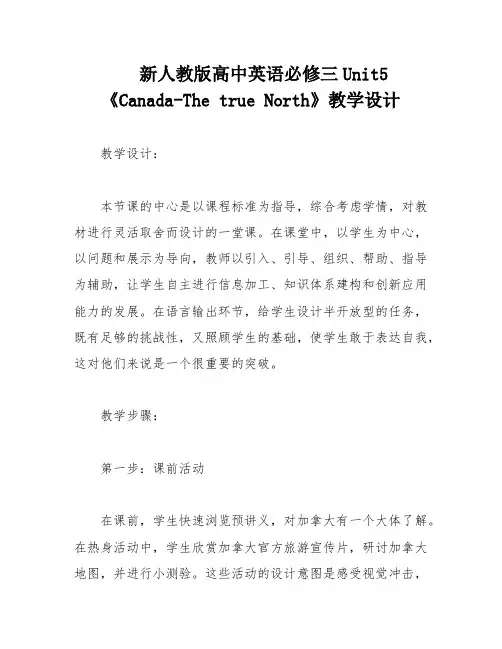
新人教版高中英语必修三Unit5《Canada-The true North》教学设计教学设计:本节课的中心是以课程标准为指导,综合考虑学情,对教材进行灵活取舍而设计的一堂课。
在课堂中,以学生为中心,以问题和展示为导向,教师以引入、引导、组织、帮助、指导为辅助,让学生自主进行信息加工、知识体系建构和创新应用能力的发展。
在语言输出环节,给学生设计半开放型的任务,既有足够的挑战性,又照顾学生的基础,使学生敢于表达自我,这对他们来说是一个很重要的突破。
教学步骤:第一步:课前活动在课前,学生快速浏览预讲义,对加拿大有一个大体了解。
在热身活动中,学生欣赏加拿大官方旅游宣传片,研讨加拿大地图,并进行小测验。
这些活动的设计意图是感受视觉冲击,激发研究兴趣,抓住学生对加拿大想要了解的兴趣,转化为地图上重要地理坐标的梳理,快速输入加拿大的基本信息,做一个初步了解。
第二步:阅读活动在阅读活动中,学生进行速读课文,完成相关任务,预测文章内容并补充完整句子,将课文段落大意连线,读取课文获取细节信息。
这些活动旨在提高学生的研究技能,特别是总结和理解文本。
同时,通过任务为导向,通过小组讨论和展示,建构知识体系,取长补短,使学生获得表达自我的成就感,从而内化为研究的动力。
教学目标:本节课的知识目标是让学生了解与旅行和加拿大有关的词汇、短语和句子结构。
能力目标是提高学生的研究技能,特别是总结和理解文本,同时练学生的口语表达能力。
情感目标是让学生欣赏多元文化现象,更好地理解国家之间的差异。
In this article。
we will XXX Canada。
XXX。
Canada is known for its vast landscapes。
friendly people。
and diverse XXX discuss some of the must-visit places in Canada and the best XXX.Firstly。
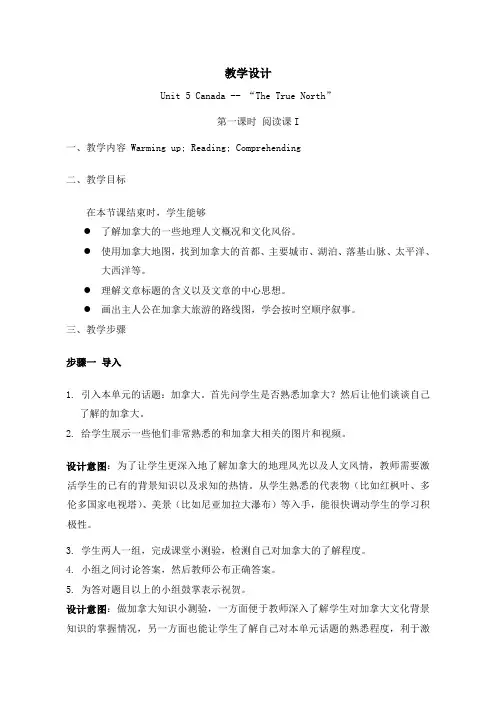
教学设计Unit 5 Canada -- “The True North”第一课时阅读课I一、教学内容 Warming up; Reading; Comprehending二、教学目标在本节课结束时,学生能够●了解加拿大的一些地理人文概况和文化风俗。
●使用加拿大地图,找到加拿大的首都、主要城市、湖泊、落基山脉、太平洋、大西洋等。
●理解文章标题的含义以及文章的中心思想。
●画出主人公在加拿大旅游的路线图,学会按时空顺序叙事。
三、教学步骤步骤一导入1. 引入本单元的话题:加拿大。
首先问学生是否熟悉加拿大?然后让他们谈谈自己了解的加拿大。
2. 给学生展示一些他们非常熟悉的和加拿大相关的图片和视频。
设计意图:为了让学生更深入地了解加拿大的地理风光以及人文风情,教师需要激活学生的已有的背景知识以及求知的热情。
从学生熟悉的代表物(比如红枫叶、多伦多国家电视塔)、美景(比如尼亚加拉大瀑布)等入手,能很快调动学生的学习积极性。
3. 学生两人一组,完成课堂小测验,检测自己对加拿大的了解程度。
4. 小组之间讨论答案,然后教师公布正确答案。
5. 为答对题目以上的小组鼓掌表示祝贺。
设计意图:做加拿大知识小测验,一方面便于教师深入了解学生对加拿大文化背景知识的掌握情况,另一方面也能让学生了解自己对本单元话题的熟悉程度,利于激发学生探索未知知识的动力。
步骤二阅读1. Reading for main idea:让学生快速阅读的同时思考:文章大意是什么,标题中“the True North”的含义是什么? 及段落连线。
学生通过阅读可能把握标题中的两层含义:字面含义以及在文章中的含义。
设计意图:让学生重视文章标题,思考题目的含义,从而更好地把握文章内容和情感,同时也能培养学生抓中心思想的能力。
另一方面,发散学生思维,从多个角度思考问题。
同时学会运用skimming的阅读技巧概括段落大意,从总体上把握文章的篇章结构。
2. Reading for information:把全班同学分成六组进行比赛。

人教版高中英语必修3《Unit5Canada—“TheTrueNorth”》教案人教版高中英语必修3《Unit 5 Canada—“The True North”》教案教学准备教学目标Teaching AimsKnowledge a nd Skills:1. Ge t to know about Canada.2.Grasp some reading skills.3.Stimulate the Ss’ interest and love for learning about foreign countries.Strategy and Method:1.Train the students’fast-reading ability.2.Train the students’ ability to co operate with others.教学重难点Main points :1. Introduce the information of Canada to the students.2.Train the students’reading ability —skimming,and listening abilityDifficult point :Learn different reading skil ls for different reading purposes.Teaching procedures and ways教学过程Step1. Readin g&Greeting (2`)Step2. Leading in and Warming Up (5`)1.Free talk: Do you like to go sightseeing?Which country do you like to visit?What can you see in these countries?2.QuizStep3. Fast- reading (10`)1.what is“the true north”?It refers to “the cross-Canada train.”2.Draw the route of the two girls’ traveling across Canada Step4. Careful- reading(T&F) (15`)Step5. Consoli dation (7`)Listening & SummaryFill in the blank and retell the story课后习题HomeworkSurf the Internet to find more information about Canada Chalkboard DesigningUnit5Canada –the “the true north”-----A thip “ on the true north”Vancouver Rocky Mountains Thunder BayCalgary Lake Superior Toronto。
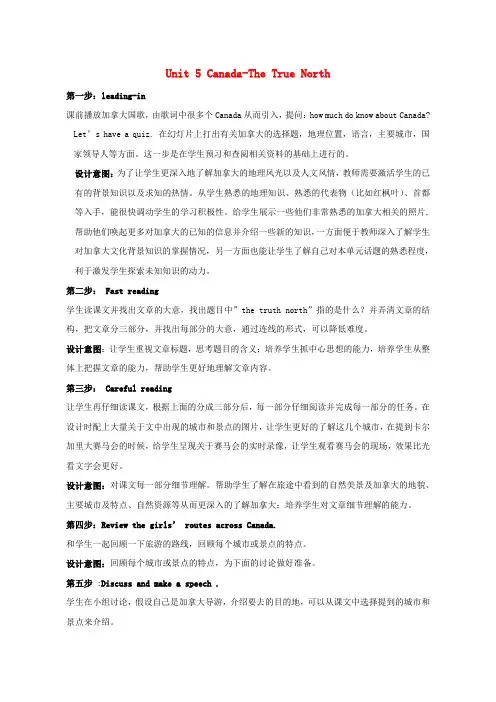
Unit 5 Canada-The True North第一步:leading-in课前播放加拿大国歌,由歌词中很多个Canada从而引入,提问:how much do know about Canada? Let’s have a quiz. 在幻灯片上打出有关加拿大的选择题,地理位置,语言,主要城市,国家领导人等方面。
这一步是在学生预习和查阅相关资料的基础上进行的。
设计意图:为了让学生更深入地了解加拿大的地理风光以及人文风情,教师需要激活学生的已有的背景知识以及求知的热情。
从学生熟悉的地理知识、熟悉的代表物(比如红枫叶)、首都等入手,能很快调动学生的学习积极性。
给学生展示一些他们非常熟悉的加拿大相关的照片, 帮助他们唤起更多对加拿大的已知的信息并介绍一些新的知识,一方面便于教师深入了解学生对加拿大文化背景知识的掌握情况,另一方面也能让学生了解自己对本单元话题的熟悉程度,利于激发学生探索未知知识的动力。
第二步: Fast reading学生读课文并找出文章的大意,找出题目中”the truth north”指的是什么?并弄清文章的结构,把文章分三部分,并找出每部分的大意,通过连线的形式,可以降低难度。
设计意图:让学生重视文章标题,思考题目的含义;培养学生抓中心思想的能力,培养学生从整体上把握文章的能力,帮助学生更好地理解文章内容。
第三步:Careful reading让学生再仔细读课文,根据上面的分成三部分后,每一部分仔细阅读并完成每一部分的任务。
在设计时配上大量关于文中出现的城市和景点的图片,让学生更好的了解这几个城市,在提到卡尔加里大赛马会的时候,给学生呈现关于赛马会的实时录像,让学生观看赛马会的现场,效果比光看文字会更好。
设计意图:对课文每一部分细节理解。
帮助学生了解在旅途中看到的自然美景及加拿大的地貌、主要城市及特点、自然资源等从而更深入的了解加拿大;培养学生对文章细节理解的能力。
第四步:Review the girls’ routes across Canada.和学生一起回顾一下旅游的路线,回顾每个城市或景点的特点。
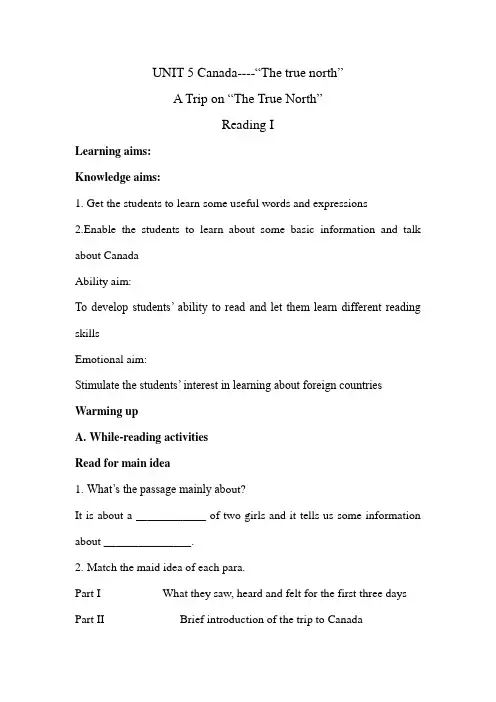
UNIT 5 Canada----“The true north”A Trip on “The True North”Reading ILearning aims:Knowledge aims:1. Get the students to learn some useful words and expressions2.Enable the students to learn about some basic information and talk about CanadaAbility aim:To develop students’ ability to read and let them learn different reading skillsEmotional aim:Stimulate the students’ interest in learning about foreign countries Warming upA.While-reading activitiesRead for main idea1.What’s the passage mainly ab out?It is about a ____________ of two girls and it tells us some information about _______________.2.Match the maid idea of each para.Part I What they saw, heard and felt for the first three days Part II Brief introduction of the trip to CanadaPart III Their chat on the way to the station3.What are the main places mentioned in the reading passage?(In time order)1) the Rocky Mountains 2) Vancouver3) Calgary 4) Toronto5) Thunder Bay at the top of Lake Superior________________________________________________________ B.Careful readingPara 1Q1:Why are the cousins not flying directly to the Atlantic coast?________________________________________________________Q2: Which continent are the cousins crossing?________________________________________________________ Para 2Q1: What is “The True North ”?___________________________________________________Q2:According to Danny Lin’s words, what can they see in Canada?________________________________________________________ Vancouver●It is ____________ by mountains and the Pacific Ocean.●People can ___ in Rocky Mountains and sail in the ________.●Wet climate makes the trees extremely tall, some _________ over 90metres.Vancouver’s population is increasing very rapidly. Why?___________________________________________________________ ________________________________________________________ Para 3What happens at the Calgary Stampede?___________________________________________________________ Cowboys________ ______ riding wild horses for thousands of _________.Para 4Q1: How are ocean ships able to reach the centre of Canada?___________________________________________________________ ________________________________________________________Q2: How much fresh water does Canada have?________________________________________________________ Find out what these numbers refer to.5,500km________________________________________________ thirty million_____________________________________________ one-third________________________________________________ C.Fill in the blanksLi Daiyu and Liu Qian took the train in Canada from_____ to______. The cousins’ friend, Danny Lin, took them to the train station tocatch“_____ _____ _____”. Canada is the ______ bigges t country in the world. It is 5,500 kilometers from ______ to ______. As they go _________, they saw beautiful scenery as well as cities. Vancouver is __________ by mountains and the Pacific Ocean. When the cousins _____ _____ in the seats, they looked out of the window. They saw mountains goats and even a grizzly bear. Calgary is famous for the Stampede. Many cowboys who ______ ______ ______ ______ riding wild horses come to compete in it. Then they ______ _______ a wheat-growing province. Thunder Bay is a busy port where ships can ____ ___ the Great Lakes . That night, the train _____ towards Toronto. Tips:Beginning: If I have the chance to travel to Canada, I prefer to go to ___, which impressed me most. ____ is a/an… city. The reasons are as follows:Body: Firstly,… Then,…. Besides,….Ending: So I’d like to choose ____.Write a short passage to report what Li Daiyu and Liu Qian saw in Canada.。
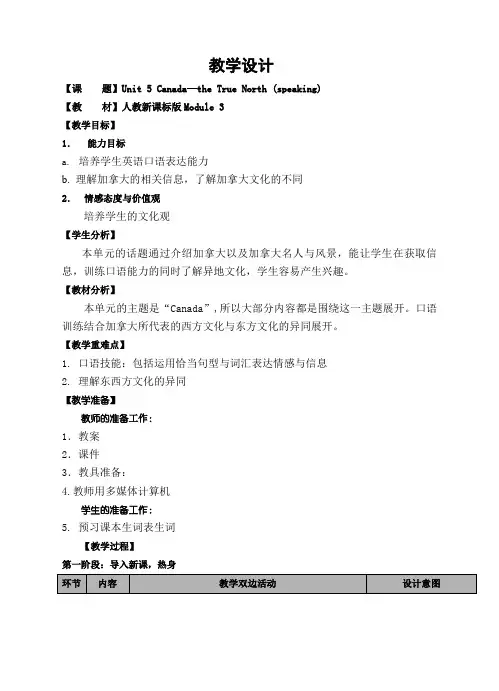
教学设计
【课题】Unit 5 Canada—the True North (speaking)
【教材】人教新课标版Module 3
【教学目标】
1.能力目标
a.培养学生英语口语表达能力
b. 理解加拿大的相关信息,了解加拿大文化的不同
2.情感态度与价值观
培养学生的文化观
【学生分析】
本单元的话题通过介绍加拿大以及加拿大名人与风景,能让学生在获取信息,训练口语能力的同时了解异地文化,学生容易产生兴趣。
【教材分析】
本单元的主题是“Canada”,所以大部分内容都是围绕这一主题展开。
口语训练结合加拿大所代表的西方文化与东方文化的异同展开。
【教学重难点】
1.口语技能:包括运用恰当句型与词汇表达情感与信息
2.理解东西方文化的异同
【教学准备】
教师的准备工作:
1.教案
2.课件
3.教具准备:
4.教师用多媒体计算机
学生的准备工作:
5.预习课本生词表生词
【教学过程】
第一阶段:导入新课,热身
第二阶段:围绕能力目标训练
第三阶段:布置作业。
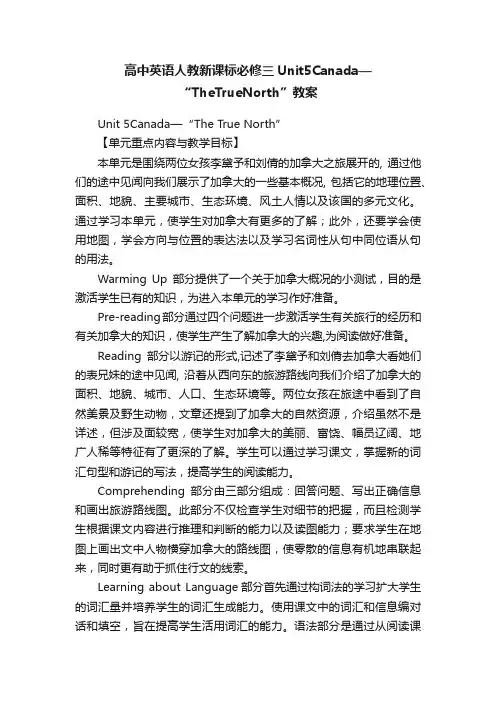
高中英语人教新课标必修三Unit5Canada—“TheTrueNorth”教案Unit 5Canada—“The True North”【单元重点内容与教学目标】本单元是围绕两位女孩李黛予和刘倩的加拿大之旅展开的, 通过他们的途中见闻向我们展示了加拿大的一些基本概况, 包括它的地理位置、面积、地貌、主要城市、生态环境、风土人情以及该国的多元文化。
通过学习本单元,使学生对加拿大有更多的了解;此外,还要学会使用地图,学会方向与位置的表达法以及学习名词性从句中同位语从句的用法。
Warming Up部分提供了一个关于加拿大概况的小测试,目的是激活学生已有的知识,为进入本单元的学习作好准备。
Pre-reading部分通过四个问题进一步激活学生有关旅行的经历和有关加拿大的知识,使学生产生了解加拿大的兴趣,为阅读做好准备。
Reading部分以游记的形式,记述了李黛予和刘倩去加拿大看她们的表兄妹的途中见闻, 沿着从西向东的旅游路线向我们介绍了加拿大的面积、地貌、城市、人口、生态环境等。
两位女孩在旅途中看到了自然美景及野生动物,文章还提到了加拿大的自然资源,介绍虽然不是详述,但涉及面较宽,使学生对加拿大的美丽、富饶、幅员辽阔、地广人稀等特征有了更深的了解。
学生可以通过学习课文,掌握新的词汇句型和游记的写法,提高学生的阅读能力。
Comprehending部分由三部分组成:回答问题、写出正确信息和画出旅游路线图。
此部分不仅检查学生对细节的把握,而且检测学生根据课文内容进行推理和判断的能力以及读图能力;要求学生在地图上画出文中人物横穿加拿大的路线图,使零散的信息有机地串联起来,同时更有助于抓住行文的线索。
Learning about Language部分首先通过构词法的学习扩大学生的词汇量并培养学生的词汇生成能力。
使用课文中的词汇和信息编对话和填空,旨在提高学生活用词汇的能力。
语法部分是通过从阅读课文中找例句然后采用造句的练习形式教同位语从句。
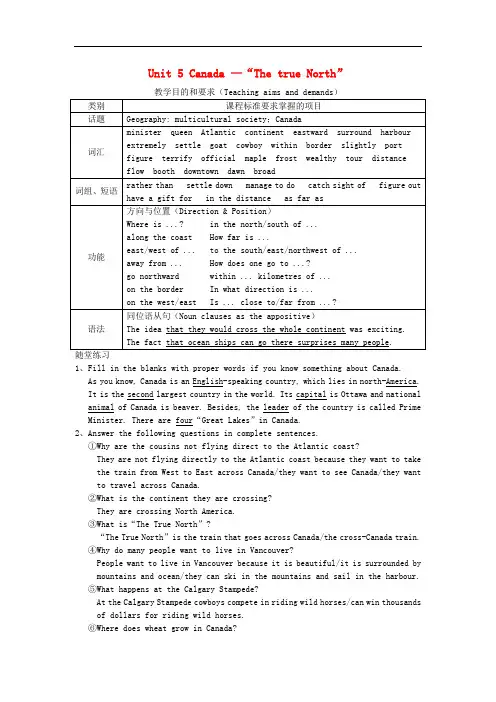
Unit 5 Canada —“The true North”1、Fill in the blanks with proper words if you know something about Canada.As you know, Canada is an English-speaking country, which lies in north-America.It is the second largest country in the world. Its capital is Ottawa and national animal of Canada is beaver. Besides, the leader of the country is called Prime Minister. There are four“Great Lakes”in Canada.2、Answer the following questions in complete sentences.①Why are the cousins not flying direct to the Atlantic coast?They are not flying directly to the Atlantic coast because they want to take the train from West to East across Canada/they want to see Canada/they want to travel across Canada.②What is the continent they are crossing?They are crossing North America.③What is“The True North”?“The True North”is the train that goes across Canada/the cross-Canada train.④Why do many people want to live in Vancouver?People want to live in Vancouver because it is beautiful/it is surrounded by mountains and ocean/they can ski in the mountains and sail in the harbour.⑤What happens at the Calgary Stampede?At the Calgary Stampede cowboys compete in riding wild horses/can win thousands of dollars for riding wild horses.⑥Where does wheat grow in Canada?Wheat grows in the centre of Canada.⑦Look at the map of Canada. Why would ships be able to reach the centre of Canada?Ships are able to reach the centre of Canada because they can follow the St Lawrence River and the Great Lakes to go there.⑧Name two nature resources that Canada has. Find the answer in the readingpassage.Canada has water from its lakes and rivers and wood from its forests.3、The following sentences are not true according to the reading passage. Writesentences with correct information. Tell your partner where you found them.①The girls went to Canada to see their relatives in Montreal.The girls went to see their relatives in the East of Canada/on the Atlantic coast of Canada.②Danny Lin was going to drive them to Vancouver.Danny Lin was going to drive them to train station to catch the cross-Canada train.③You can cross Canada in less than five days by bicycle.You can’t cross Canada in five days by bicycle./You can’t cross Canada in less than five days by train.④The girls looked out of the windows and saw Native Indians and cowboys.The girls looked out of the windows and saw a grizzly bear, mountain goats and wild scenery.⑤Thunder Bay is a port city in the south of Canada, near Toronto.Thunder Bay is a port city at the top end of Great Lakes, near the centre of the country.4、Draw the route of the two girls travelling across Canada on the map on page 33.The route should go from West(Vancouver), through the Rocky Mountains across the southern area of Canada through Calgary, Saskatoon, Winnipeg, Thunder Bay, across the north of Lake Superior, around and down the east side of lakes to Toronto.课堂笔记1、Rather than take the aeroplane all the way, they decided to fly from China toVancouver and to take the train from west to east across Canada in September.她们不想一路乘飞机,她们决定九月从中国飞到温哥华,再从西海岸乘火车横穿加拿大到达东海岸。
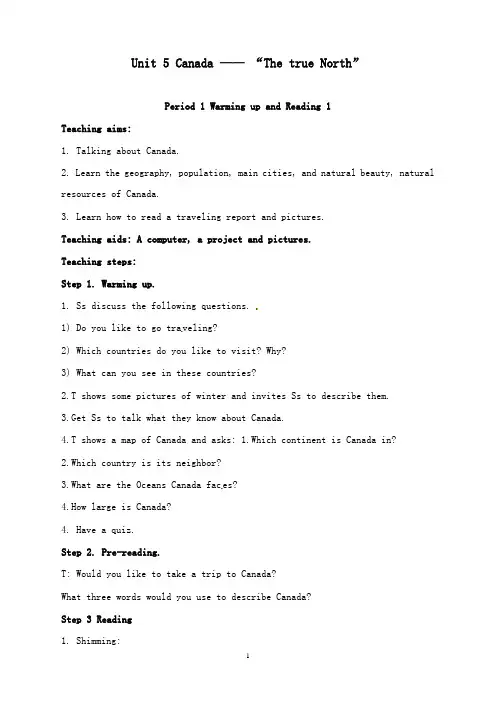
Unit 5 Canada ——“The true North”Period 1 Warming up and Reading 1Teaching aims:1. Talking about Canada.2. Learn the geography, population, main cities, and natural beauty, natural resources of Canada.3. Learn how to read a traveling report and pictures.Teaching aids: A computer, a project and pictures.Teaching steps:Step 1. Warming up.1. Ss discuss the following questions.1) Do you like to go tra veling?2) Which countries do you like to visit? Why?3) What can you see in these countries?2.T shows some pictures of winter and invites Ss to describe them.3.Get Ss to talk what they know about Canada.4.T shows a map of Canada and asks: 1.Which continent is Canada in?2.Which country is its neighbor?3.What are the Oceans Canada fac es?4.How large is Canada?4. Have a quiz.Step 2. Pre-reading.T: Would you like to take a trip to Canada?What three words would you use to describe Canada?Step 3 Reading1. Shimming:Get Ss to read the passage quickly and answer the following questions: 1) What is the passage mainly about?Sample:The passage is about a trip of two girls, and it tells us some information about Canada.2) What is “The Ture No rth”?Sample:“The True North” is the train that goes across Canada / the cross-Canada train.3) How many cities are mentioned in the text? What are they?Sample:Vancouver – Calgary—Thunder Bay—Toronto4) What do you know about each city?Vancouver :the warmest part of Canada; the most beautiful city in Canadamany Asian want to live there;the trees are extremely tall.the oldest and most beautiful forests in the worldCalgary:famous for StampedeCowboys come to compete in riding wild horses.good at working with animalsthey can win a lot of money in prizes.Thunder Bay:at the top end of the Great Lakes;very busy portclose to the centre of the country ,so that ocean ships can go there.2. Detailed reading:1) Get Ss to read the passage again and correct the following sentences.1. The girls went to Canada to see their relatives in Montreal.(in the East of Canada / on the Atlantic coast of Canada)2. Danny Lin was goi ng to drive them to Vancouver.(the train station to catch the cross-Canada train)3. You can cross Canada in less than five days by bicycle.(can’t)4. The girls looked out the windows and saw Native Indians and cowboys.(a grizzly bear, mountain goats and wild scenery)5. Thunder Bay is a port city in the south of Canada, near Toronto.(at the top end of the Great Lakes, near the center of the country)2) Listen to the tape and fill in the blanks from the text.Canada is _____ than the United States. It is the _______largest country in the world.It is _____ kilometers from coast to coast in Canada.The population of Canada is onl y slightly over_____________.Canada has _________ of the world’s fresh water, much of which is in the ___________.On the coast north of Vancouver some of the oldest and most beautiful _______ in the world still remain. It is so wet there that the trees are extremely ______.Period 2 Language points:1.Canada is a multicultural country like China. 加拿大像中国一样是一个多元化国家。
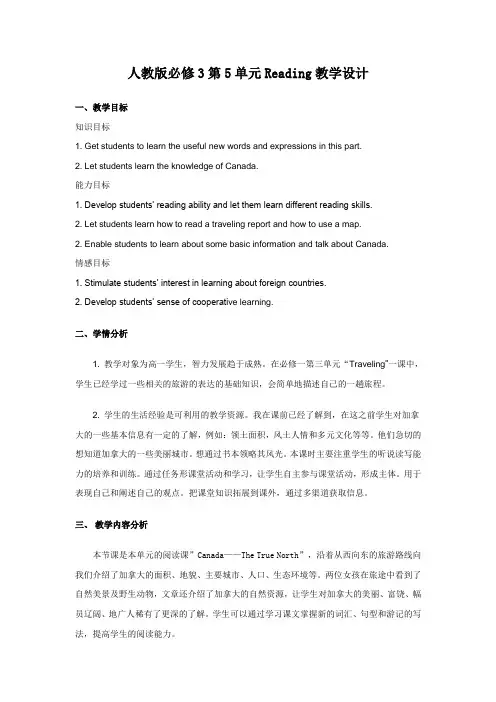
人教版必修3第5单元Reading教学设计一、教学目标知识目标1. Get students to learn the useful new words and expressions in this part.2. Let students learn the knowledge of Canada.能力目标1. Develop students’ reading ability and let them learn different reading skills.2. Let students learn how to read a traveling report and how to use a map.2. Enable students to learn about some basic information and talk about Canada.情感目标1. Stimulate students’ interest in learning about foreign countries.2. Develop students’ sense of cooperati ve learning.二、学情分析1. 教学对象为高一学生,智力发展趋于成熟。
在必修一第三单元“Traveling”一课中,学生已经学过一些相关的旅游的表达的基础知识,会简单地描述自己的一趟旅程。
2. 学生的生活经验是可利用的教学资源。
我在课前已经了解到,在这之前学生对加拿大的一些基本信息有一定的了解,例如:领土面积,风土人情和多元文化等等。
他们急切的想知道加拿大的一些美丽城市。
想通过书本领略其风光。
本课时主要注重学生的听说读写能力的培养和训练。
通过任务形课堂活动和学习,让学生自主参与课堂活动,形成主体。
用于表现自己和阐述自己的观点。
把课堂知识拓展到课外,通过多渠道获取信息。
三、教学内容分析本节课是本单元的阅读课”Canada——The True North”,沿着从西向东的旅游路线向我们介绍了加拿大的面积、地貌、主要城市、人口、生态环境等。

人教版高中英语必修3教案Unit 5 Canada ----- “The True North”The unit introduces the students to some basic information about Canada, its geography, its culture and its population. Canada is a big country. It is the second largest country in the world after Russia. It is also a beautiful country, especially in Autumn, you can see maple leaves in hundreds of different colors. Canada is a multicultural country as well, with citizens from European, Asian and African countries.The unit is essentially descriptive, although some questions can be introduced about different cultures.The functional items dealing with direction and locations can be easily applied to descriptions of China and other world geography.Four lakes: Lake superior (苏必利尔湖), Lake Huron(休伦湖), Lake Erie(伊利湖) and Lake Ontario(安大略湖).Total area: about 9,984,670 square kilometersPopulation: about 32,227,000, very sparsely populated countryLanguages: English 59.3% (official), French 23.2% (official), other 17.5%Administrative divisions: 10 provinces and 3 territoriesSports: Canada`s most popular sports include swimming, ice hockey, cross-country and Alpine skiing, baseball, tennis, basketball and golf. Ice hockey and lacrosse are Canada`s national sports.The national emblems(标志, 徽章) of Canada: There are two national emblems of Canada. One is the Canadian beaver, a clever and hardworking animal that has thick fur and a wide flat tail. It cuts down trees with its teeth. The second emblem is the Canadian maple leaf that is in the middle of the national flag which is considered an official symbol of Canada. The best time to see the leaves is autumn when the maple leaves turn hundreds of different colors. As the saying goes, “If you have never seen Canada in the fall, you have never known the meaning of brightly colored.”Niagara Falls: It is said that “if you haven`t been to Niagara Falls, you cannot be said to have been to Canada”. Three reasons make Niagara Falls exceed all the other falls in the world: First of all, it has a very long history as a tourist attraction. Secondly, it provides a unique sight to tourists. Thirdly, being situated on the Canadian-US border, it is very easy for tourists to get there. As a lot of young couples come here to celebrate their honeymoon, it is known as “the honeymoon capital of the world”.The first period: Warming up and ReadingImportant points: let the students read the passage and learn about the geography, population, main cities, natural beauty, and natural resources of Canada. Get t students to learn different reading skills.Difficult points: develop students` reading ability and enable them to learn about some basic information and talk about Canada.The passage describes a trip across Canada by train. The name of the train “the True North” is taken from a line in Cana`s national anthem.Step 1 Leading-in and Warming up1. Show them a map of Canada and talk about Canada. Then ask them some questions:1). What kind of country is Canada?(Canada is a multicultural country.)2). How large is it?(It is the second largest country in the world. It covers an area of 9.984.670 square kilometers. It is a bit bigger than China.)3). What else do you know about Canada?(vary answers.)Step 2 Pre-reading1. Let students discuss the following questions:1). What is the longest trip you have ever taken?2). If you take a trip to Canada, what do you think you might see there?3). What three words would you use to describe Canada?2. Have students turn to Page 34 and look at the title of the reading passage and the pictures and predict what the passage is about. Then have the students read the passage quickly to see if they are right.Step 3 ReadingFast reading: read the passage and answer the following questions.1). What is the passage about?(It is about a trip of two girls, and it tells us some information about Canada.)2). What is “The True North”?(It is the train that goes across Canada / the cross-Canada train.)3). How many cities are mentioned in the text? What are they?(Five. They are Montreal, Vancouver, Calgary, Thunder Bay and Toronto.)2. Intensive reading: read the text carefully to understand the main idea of each paragraph and important details.Choose the best answers to each question.1). As you go eastwards, you can see the following things except------.A. mountainsB. thousands of lakesC. forests and wide riversD. cows2). Who will take part in the Calgary Stampede?A. Cowboys from StampedeB. people from CanadaC. Anyone who has a gift for ridingD. Cowboys from all over the world3). Which of the following statement is true?A. One can cross Canada in less than 5 day by trainB. Many people think Calgary is the most beautiful city in CanadaC. In fact, the population of Canada is more than thirty millionD. Ocean ships cannot reach Thunder Bay4). Which of the following shows the right route of the cousin`s travel?A. Toronto →Calgary →Vancouver →Thunder BayB. Vancouver →Calgary→Thunder Bay →TorontoC. Vancouver →Thunder Bay →Calgary →TorontoD. Toronto →Thunder Bay →Calgary →Vancouver(The answers: DDCB)4. Answer the following questions.1). What continent are the cousins crossing?(They are crossing The North America.)2). Why are they not flying directly to the Atlantic coast?(They want to take the train from west to east across Canada.)3). Why is the population of Vancouver growing so rapidly?(It is beautiful with mountains and oceans surrounding.)4). What happens at the Calgary Stampede?(Cowboys compete in riding wild horses for thousands of dollars.)5). How are ocean ships able to reach the center of Canada?(They can follow the St Lawrence River and the Great Lakes.)6). What are some of Canada`s greatest natural resources?(Canada has fresh water from its lakes and rivers and wood from its forests.)5. Reading and discussing: read the passage a third time and then discuss these questions.1) Which part of the reading passage interests you most?(I am most interested in the part about Calgary. I hope to visit it someday and see the Calgary stampede. I love animals, and I think it will be very interesting to see cowboys who have a gift for riding wild horses.)2) If someday you go to Canada, where will you go? Why?6. Dealing some language points:Help them analyze some difficult, long and complex sentences and guess the meaning of some new words and expressions. Encourage them to try to deal with the language points in the context. Give them some explanation if necessary.7. Listening and reading aloud:Ask them to read the passage aloud to the tape and let them pay attention to the pronunciation of each new words and the pause within each sentence.Tell them to pick out the useful collocations: be on a trip to, rather than, take the aeroplane, all the way, take the train, on the way to, chat about, as well as, less than, aboard the train, settle down, manage to do, catch sight of, be famous for, have a gift for, thousands of, in prizes, be amazed to do, at the top of, be surprised at, because of, fresh waterStep 4 Consolidation2. Complete the summary of the story with one word in each blank and retell the whole story.Li Daiyu and Liu Qian were on a trip across Canada. Instead of taking the aeroplane all the way, they would cross the whole continent of Canada in a train after arriving Vancouver by air.Danny Lin waited for them at the airport and gave them a brief introduction about Canada, the second biggest country in the world and Vancouver, the most beautiful city of the country, while taking them to catch the train, “The True North”.Having settled down in the seats, they looked out of the window at the wild scenery, the mountain goats, and grizzly bears. They went by the city of Calgary and arrived in Thunder Bay, a city at the top of the Great Lakes, learning more about Canada of its population resources and so on. Their last stop was Toronto, one of the southernmost cities in Canada.Step 5 HomeworkLearn the useful new words and expressions by heart.Read the reading passage again try to retell the passage.The second period: Learning about language: important language pointsThe emphasis of this period will be place on the important new words, expressions and sentence patterns in the parts Warming up, Reading, and Comprehending.Important points: enable students to grasp the usages of such important new words and expressions as surround, measure, confirm, impress, rather than, manage to do, and to master the patterns “The thought that they could cross the whole continent was exciting.” And “It is so wet there that the trees are extremely tall, some measuring over 90 meters”Difficult points: how to get students to understand some useful words and expressions as well as some long and difficult sentences correctly.Knowledge aims:1). Get students to learn and grasp the important useful new words and expressions in this part.2). Let students learn the following important useful sentence patterns:Rather than take the aeroplane all the way, they decided to fly to Vancouver and then take the train west to east across Canada. (rather than …..)The thought that they could cross the whole continent was exciting. (noun clause as the appositive)Going eastward, you will pass mountains and thousands of lakes and forests, as well as wide rivers and large cities. (present participle used as adverbial)Skiing in the Rocky Mountains and sailing in the harbor make Vancouver one of Canada`s most popular cities to live in. (make + O + O.C)It is so wet there that the trees are extremely tall, some measuring over 90 meters. (“pronoun + doing” used as adverbial)Because of the Great Lakes, they learned, Canada has more fresh water than any other country in the world. (more… than any other….)Step 1 RevisionCheck the homework exercises.Ask some students to retell the passage A TRIP ON “THE TRUE NORTH”.Step 2 Reading and findingGet students to read through Warming up, Pre-reading, Reading and Comprehending to underline all the new words and expressions or collocations.Step 3 Practice for useful words and expressions.Turn to page 36. go through the exercises in Discovering useful new words and expressions with students and make sure they know what to do.Step 4 Studying important language points1. multi- : multiparty多党的, multinational多民族的, multipurpose多用途的, multiform多形式的, multistory多层的, multimedia多媒体的a multicultural country多元文化国家2. be on a trip to…., go on a trip to…., make a trip to….., take a trip to….3. rather than: in preference to sb. / sth.I will have a lemonade rather than a coke.He was busy writing a letter rather than reading a newspaper.4. surround: cause sb. / sth. to move into position all round sb. / sthsurround sb. / sth. with sb. / sth; be surrounded with…..The fence surrounds the school.They have surrounded the town with troops.The house is surrounded by high walls.5. north of = to the north ofThey lives (to the) east of Los Angeles.It`s about four hundred kilometers northeast of Toronto.6. measure: find the size, length, volume, etc. by comparing it with a standard unit, asses, 估计, 衡量, 判定Mother measured me to see what size of dress I should have.It is hard to measure his ability when we haven`t seen his work.The room measures 10 meters across.Which measure do they use?They took strong measures against dangerous drivers.7. settle down: cause sb. to become calm, less restlessWait until the children settled down before you start the lesson.Have you settled down in your new job yet?8. manage to do sth. succeed in doing sth.The pilot managed to circle the balloon for some time.At first, no ready technical data were available, but we managed to go without.I just about managed to get up the stairs.9. catch sight of: see sb. / sth. for momentShe caught sight of a car in the distance.10. have a gift for: have natural talent or ability in sth. / doing sth.It seems he has a gift for learning language.She has a gift for music.Step 5 Using words, expressions and patternsDo exercises in Using words and expressions on page 70-71.Step 6 HomeworkFinish off the Workbook exercises.Learn the new words and expressions by heart.设计方案(二)Step 1 Revision1. Check the homework.2. Ask some students to dictate some useful new words and expressions.Step 2 V ocabulary study1. Let students review the new words and expressions in Warming up, Pre-reading, Reading and Comprehending and give time to students to ask their own questions.2. Explain the new words and expressions.Step 3 Practice for useful words and expressionsLet students do the following exercises and check the answers after most of them finish.1.Find words that mean the same to fill in the blanks.1). ------ bags that people take with them when they travel2). ------ a government member who is in charge of a government department3). ------ a short informal test4). ------ to take to someone in a friendly, informal way5). ------ on or onto a ship, plane, bus or train6). ------ general appearance of nature around you, especially beautiful nature7). ------ in or by a very small amount, so small that it almost cannot be seen8). ------ to be all around somebody or something on every side3. Make sentences with the useful expressions below.rather than, settle down, manage to do, catch sight of, have a gift forStep 4 Sentence focusAsk students to read through the Warming up and Reading to find out the difficult sentences they cannot understand and give time to students to ask their own questions. Explain them to the class.Step 5 Workbook exercises for consolidationAsk students to do the exercises in Using Words and Expressions on page 70-71 to consolidation what they have learned in this period.Step 6 HomeworkLearn the new words and expressions by heart.Finish off the Workbook exercises.Do exercise 3 on page 70-71 in the exercise book.Surf the Internet to find as much information about Canada as you can. Take notes and compare it withThe third period: Learning about language: GrammarThe teaching period mainly deals with the following: 1). Reviewing noun clauses as the subject; 2). Learning the new grammar item: noun clauses as the appositive.Important points: get the students to understand and use noun clauses as the appositive.Difficult points: enable students to learn how to use noun clauses as the appositive correctly.Step 1 Revision1. Check the homework exercises.2. Dictate some new words and expressions.3. Underline the noun clauses in each sentence of the following and then tell what kind of noun clause it is. What it was to become was a mystery.I don`t know who will help Henry to win the bet.His trouble is that he doesn`t know anyone in London.It has not been decided yet when the new restaurant will open.It looked as if it was going to snow.Do you know why he crossed his arms?Step 2 PreparationShow the following two sentences for them to see. Ask them to read each of them and then underline its appositive.Their friend, Danny Lin, was waiting at the airport.He was going to take them and their baggage to catch “The True North”, the cross-Canada train.The thought that they could cross the whole continent was exciting.We were very excited at the news that our team had won.Step 3 Grammar learning1. Reading and learning: turn to page 34 to read through the reading passage and find out all the sentences where noun clauses are used as the oppositive and underline them.The thought that they could cross the whole continent was exciting.Some people have the idea that you can cross Canada in less than five days, but they forget the fact that Canada is 5,500 kilometers from coast to coast.The girls were surprised at the fact that ocean ships can sail up the Great Lakes.2.Summing up: noun clauses as the appositive.同位语从句在主从复合句中, 用作同谓语的从句, 叫同位语从句. 它一般跟在某些名词( 如fact, news, truth, hop, problem, information, wish, promise, evidence, report, explanation, suggestion, conclusion) 等后, 用以说明或者解释前面的名词.连接词:A. 从属连词: that, whether等.The news that they had won the game soon spread over the whole city.We will discuss the problem whether the sports meeting will be held on time.B. 连接代词: what, who等.Next comes the question what you want to put in the box.I have no idea who he is.C. 连接副词: how, when, why等.I have no impression how he came back, perhaps by bike.I have no idea when he will be back.同位语从句与定语从句的区别:从形式上看, 同位语从句和定语从句很相似, 都是放在某一个名词后面, 但同位语从句不同于定语从句. 同位语从句对名词加以补充说明, 是名词全部内容的体现; 定语从句说明先行词的性质与特征, 与先行词是修饰与被修饰的关系.The news that our team has won is true. (同位语从句)The news that you heard is not true. (定语从句)That 在同位语中不作任何成分, 是从属连词; 而在定语从句中但任句子成分, 是关系代词.The fact that we succeeded pleased everybody.The fact that we talked about is very interesting.Step 4 Grammar practiceTurn to page 37 and do Exercise 2 in Discovering useful structures.Turn to page 71 and do Exercise 1.Step 5 Closing by a quiz.1). They have no idea at all -----.A. where he has goneB. where did he goC. which place has he goneD. where has he gone2). I have no idea ----- far the airport is from here.A. whatB. howC. it`sD. that3). The manager asked the question ----- I would like to be his secretary.A. ifB. thatC. whetherD. how4). ----- is a fact ----- English is being accepted as an international language.A. It; thatB. That; thatC. It; whichD. As; that5). The reason ----- she didn`t say anything was ----- she was ill.A. why; thatB. why; becauseC. that; whyD. why; why6). There is a new problem involved in the popularity of private cars -----road conditions need to be improved.A. thatB. whichC. whereD. when7). The question has been raised at the meeting ----- each member country should share the expenses of the committee. A. which B. if C. what D. whether8). There is a common belief among them ----- rubbish can and should be put to good use.A. whichB. ifC. whetherD. that9). Information has been put forward ----- more middle school graduates will be admitted into university.A. whileB. thatC. whenD. as10). It is no longer a question ----- man is learning more and more about space.A. whetherB. thatC. ifD. how11). Several years ago no one had any idea ___ Xiao Shenyang could become so popular all round the country.A. whetherB. whatC. thatD. when12). Most students who learn English will meet with a problem ____ they can remember so many English words. A. when B. where C. that D. how13). There is feeling in him ____ he will make much money after this project.A. whichB. whatC. thatD. how14). The man looked so familiar, but I didn`t have any idea ____ I had met him before.A. whichB. howC. thatD. where15). There is no doubt _____ we can defeat A/H1N1 finally.A. whetherB. thatC. whatD. if16). MR Green asked the boy a question _____ he could guide him to the headmaster`s office.A. whetherB. thatC. whatD. if17). The view ____ Dr Smith raised at the meeting was paid much attention to.A. howB. whatC. whichD. why18). Gordon asks me the question whenever he meets me _____ the work ____ he has been doing for several years is worth doing.A. that; thatB. when; whichC. where; whatD. whether; 不填19). It was a matter of _____ would take the position after Bob`s retirement.A. whoB. whoeverC. whomD. whomever20). Lucy explained to her doctor _____ her headache had begun one year before, and ______, only because of this, she had failed the exam.A. when; howB. how; howC. how; whenD. why; why( Answers: ABCAA ADDBB CDCDB ACDAB)Step 6 HomeworkFinish off the Workbook exercises.Preview the reading passage “The True North” FROM TORANTO TO MONTRAL on page 38.The forth period: Using Language: Listening and talkingThe listening passage introduces information about the cultural and racial composition of Canada. Canada is one of the few countries that have an official multicultural policy. The population is changing rapidly and immigrants from China are among the most numerous recently.Important points: develop students` listening ability and enable them to master different listening skills in order to get them to talk about the major similarities and differences between China and Canada.Difficult points: get students to listen to the materials and talk about the similarities and differences between Canada and China.Step 1 Revision1. Check the homework exercises.2. Ask some students to translate some sentences using noun clauses as the appositive.1). 他登上月球的消息迅速传遍了全国.2). 将军下达了战士们立即过河的命令.3). 是否该做这件事,这一问题使他很烦恼.4). 你不知道我有多么着急.5). 他突然想到敌人可能已经逃出城了.Step 2 Warming up1. Tell students to turn to Page 37. and listen to the material after having discussed the main idea.2. Play the tape for them to listen and do the exercises according to the information.1). Canada is a mixture of ----------------------.2). Canada encourages people to keep ------------------.3). If you live in the province of Quebec, ------------------------.4). Native Indians and Inuit are trying to -------------------------.5). More than ------------ languages are used in radio and TV programs.6). You may find areas where ----------- live near each other.7). The families --------------- are usually all mixed up.Step 3 Listening on Page 691. Turn to Page 69. First, ask them to read through the directions and the exercises to make sure they know what to do. Then, get them to do some exercises.2. Play the tape for them to listen two times.True or false exercises:1). China is over 7000 kilometers from east to west.2). Both China and Canada have mountains in the west of the country.3). The Great Wall cannot keep the desert`s dust away from Beijing.4). China has 15 neighboring countries while Canada only has one.5). Canadians cannot talk with people in their neighboring country because they do not speak English.Step 4 TalkingShow them a map of Canada and a map of China and get them to talk about the similarities and differences between Canada and China.Step 5 Listening Task on Page 721. Turn to page 72 and tell students: we are going to listen to the introductions of three famous Canadians in different areas of work.Step 6 SummaryWe mainly focus on the listening ability. It is very important. If your listening is poor, you had better practice more. The more you listen to English, the better your listening is. Remember: Practice makes perfect.Step 7 HomeworkFinish off the homework.Read the listening texts again and try to learn more about Canada from them.The fifth period: Extensive readingIn this period, the teaching emphasis will be put on developing students` reading ability by reading extensively.Important points: develop students` reading skills by extensive reading.Difficult points: get students to understand some difficult and long sentences by using reading strategies such as skimming and scanning.Step 1 RevisionCheck the homework exercises.Ask some students to talk about the major similarities and differences between China and Canada.Step 2 Leading-inHave some students to retell the reading passage A TRIP ON “THE TRUE NORTH”.Turn to page 38 to read another passage “THE TRUE NORTH” FROM TORONTO TO MONTREAL and learn more about Canada.Step 3 Reading1. Ask students to read the passage quickly and then do the following as soon as possible.1). Tick out the things mentioned in the text.(1) the climate in Canada(2) the population in Toronto(3) the CN Tower in Toronto(4) Toronto`s economic(5) a lake which is on the north side of Niagara Falls(6) good Cantonese food(7) famous restaurants in Toronto(8) the old Montreal(9) the location of Montreal(10) brief introduction to MontrealThe answers: (1) (3) (5) (6) (8) (10)2. How many parts can the passage be divided into? Write out the main idea of each part.Part one (paragraph 1): Fall had arrived in Canada.Part two (paragraph 2-4): Their tour of the city Toronto.Part three (paragraph 5): Their travel in Montreal.Part four (paragraph6): They left for the east coast.3.Ask students to read carefully and do the following questions:1). What can sometimes be seen from the CN Tower in Toronto?(Sometimes the misty cloud that rises from Niagara Falls can be seen from the CN Tower.)2). Why is there good Cantonese food in Toronto?(There is good Cantonese food in Toronto because most of the Chinese people there came from South China, especially Hong Kong.)3). Which direction is the train going from Toronto?(The train is going east from Toronto.)4). What are the three things that show Montreal a French city?(Good coffee, good bread and good music show that Montreal is a French city.)5. Ask students to read the passage again and find out the useful collocations: from…to…, the next morning, on the ground, around noon, leave for, go on a tour, in the distance, on the south side of, on one`s way, home of, a telephone booth, around dusk, over dinner, chat with sb. come from, South China, go as far as, at dawn, be close to, spend…..doing, be on a train trip, dream ofStep 4 Important language points1. confirm: provide evidence for the truth or correctness of; establish the truth of; make definite or establish more firmly批准, 肯定证实Please confirm your telephone message by writing to me.My employer will confirm that I was there on time.The new minister will be confirmed in office by the Queen.2. not….untilWe do not leave until this evening.The noise in the street didn`t stop until midnight.3. go on a tour: visit; go on a tripWe went on a tour of the museum the other day.5.in the distance: far away 在远处The man standing in the distance is my head master.6.as far as: to the place mentioned, but no furtherI walked as far as the foot of the mountain.Sarah has read as far as the fourth volume.7.broad:a broad street, avenue, river, canal.A river twenty meters boardThere is broad support for the government`s policies.A man of broad views 心胸豁达的人Step 5 Reading TaskStep 6 HomeworkFinish off the Homework exercises.Learn the useful new words and expressions by heart.Tell your friends or family something about Canada.The sixth period: Using language: Speaking and writingImportant points: develop students` speaking and writing ability and get them to use the expressions of direction and position.Difficult points: how to develop students` speaking and writing abilities.Step 1 RevisionCheck the homework exercises.Ask some students to retell the passage “THE TRUE NORTH” FROM TORONTO TO MONTREAL.Step 2 Warming up2. Ask students to ask and answer questions in pairs by using the useful expressions.Step 3 SpeakingShow them some adjectives to express one`s feeling: excited, afraid, terrified, worried, pleased, tired, happy, impressed, surprised, amazed, satisfied …..Get them to make a dialogue to talk about two or three more impressive things and their feelings when they experienced something.Step 4 WritingTask: write a short passage about the two or three most impressive things during the trip across Canada.Step 5 HomeworkReview the contents of the unit and note down the important words and expressions.Write a short report.补充练习1. Word spelling.1). They came from Canada, so they are Canadians.(加拿大人)2). The new minister(部长) will be confirmed(批准) in office by the Queen.3). This world we live in is divided into seven continents.(大陆)4). The scenery(风景,景色) in the mountains is very beautiful.5). She has always been surrounded(包围, 环绕) with fashionable friends.6). They took strong measures(措施) against dangerous drivers.7). We reached the harbor at sunset.(港口)8). It is a tradition that the young look after the old in the family.(传统)9). The animals were terrified by the storm.(吓坏)10). His words are strongly impressed on my memory.(使印象深刻)2. Fill in the blanks with the expressions give below. Use each expression only once and make changes where1). I cold see the faint gleam of light in the distance.2). After retirement, the old man settled down in a faraway village.3). He has a gift for making everyone around him feel happy.4). Rather than risk breaking up his marriage he told his wife everything.5). She caught sight of a car in the distance and ran towards it.6). The pilot managed to circle the balloon for some time.3. Choose the best answers:1). Information has been put forward ----- more middle school graduates will be admitted into universities.A. whileB. thatC. whenD. as2). ------ is no possibility ----- Bob can win the first prize in the match.A. There; thatB. It; thatC. There; whetherD. It; whether3). There is much chance ----- Bill will recover from his injury in time for the race.A. thatB. whichC. untilD. if4). Nobody believe his reason for being absent from the class was ----- he had to meet his uncle in the airport.。
教学设计方案课题名称:A Trip on “The True North”姓名:工作单位:学科年级:高一英语教材版本:新人教版一、教学内容分析本节课主题为“真北方”之旅,以游记的形式向读者呈现加拿大的地形地貌及城市特色。
线索清晰,沿着列车行驶的路线介绍行经的城市及山脉等。
教材分为reading,comprehending两个部分。
comprehending部分针对性很强地提出了一些问题,并针对加拿大的基本情况设计了表格便于学生检验阅读效果二、教学目标At the end of this lesson, the students will be able to:1. Summarize what they knew about Canada (geography, population, languages, important cities and their features, etc.) by exchanging information among themselves.2. Predict general idea of the passage by reading the pictures and title.3. Check their prediction and mark the travel route on the map by skimming.4. Describe the locations and features of the important cities with the words in the passage and some common structures about describing direction and position by scanning and “Tour guide” activity5. Answer the questions and finish the exercises about this passage by reading the passage again.6. It is hoped that students can know some basic information about Canada and be eager to do some further analysis about Canada.二、学习者特征分析高一学生对游记的行文方式已经有了比较多的认识,因此在线索明了的情形下可以让学生通过小组合作的形式将文章的主要内容读懂。
Unit 5 Canada---The true northTeaching aims:1.Talk about the basic information about Canada.2.Learn how to read a traveling report and use maps.3.Learn to express locations and directions.4.Master the noun clauses--- appositive clause5.Vocabulary: minister, continent, surround, dawn, booth, slightly, settle down,have a gift for, figure out, as far as, all the way, rather thanThe first periodStep ⅠRevision1.Check the students’ homework2.Check the assignment.Step ⅡLead-in and warming upShow the students the maple flag and ask them some questions.T: Do you know which country uses this national flag?Ss: Canada.T: What continent is Canada in?Ss: In North America.T: How large is it?Ss: It is the second largest country in the world.T: Yes. It occupies an area of 9,984,670 square kilometers. It is a bit bigger than China. Which country is its neighbor?Ss: The United States.(Show a map of Canada to the students)T. Right. The United States is . Canada is a beautiful country. First let’s have a quiz and see how much do you know about Canada.( Give the Ss one minute to finish the quiz.)T: OK. Time is up. Let’s check the answers.1.C2.D3.A4.B5.AStep ⅢPre-readingT: Now I want to ask you a question: Do you like travelling?Ss: Yes.T: I know most of you do. So have you ever been abroad?Ss: Yes/No.T: What’s the longest trip you have ever taken?…T: Very good. If we want to make our motherland more beautiful and more developed, we should know more about other countries. Here are two questions, you may ask your partner for answers and give your answers to him/her.a.If you take a trip to Canada, what do you expect to see?b.What three words would you use to describe Canada?(Ask some pairs to tell their ideas to their classmates.)Step ⅣFast readingGet the students to read the passage quickly and accurately and meanwhile help the students to form a good habit of reading.T: Do you feel puzzled when you read the title? What is the true north? Now read the passage and get the general idea of the passage. Underline the main places mentioned in the text.Give the Ss 5 minutes for reading.a.What the passage is mainly about?b.What are the main places mentioned in the text?c.Draw the traveling route of the two girls on the map.T: Do you have any difficulty in reading? Now let’s discuss some difficult points together.Step ⅤHomework1.Remember the underlined sentence.2.Write a short passage to report what Li Daiyu and Liu Qian saw in Canada.The second periodStep ⅠRevision1. Have a dictation.2. Ask two students to write on the blackboard.3. Ask one student to make a short report.Step ⅡLead-inT: Li Daiyu and Liu Qian were on the train yesterday. The train rushed across the top of the Lake Superior. Which is the next city it runs towards?Ss: Toronto.T: Toronto is an important city. It is the finance center of Canada. It has rich popular arts and culture. How much do you know about Toronto?Ss: There are Chinatowns where you can buy Chinese medicine.T: Quite right. Do you want to know more about Toronto?Ss: Yes.Step ⅢReadingT: Read the passage on 38. In this passage, you can learn a lot about Toronto, and Montreal, which is Canada’s second largest city. I will give you four minutes to read the passage, then answer the questions on 37—38.Four minutes later, check the answers with the class.Step ⅣIntensive reading(reading task)T: Read the passage and fill in the chart using the information of the text.T: You can have a discussion with your partner.Step ⅤDiscussionStep ⅥHomework1.Read the two passages again and find the main characters of Toronto, Montrealand Iqaluit.2.Read fun reading by yourself.。
Unit 5 Canada—“The True North”第一部分《金色教案》教学设计说明About the topic and the structures 单元话题和结构 本单元以节日为话题,介绍了世界各地的一些节日的含义、由来和民俗。
通过本单元的学习,可以帮助学生更多地了解节日、体味文化;同时又可以引导学生理解、尊重不同的文化和习俗。
本单元语言功能项目是:方向、位置和情感。
本单元语言结构项目是“名词从句作同位语”。
本单元还要求学生学习写作“描写文:报道”。
《金色教案》教学设计在单元课时划分上与课本保持一致,即“阅读课、知识课、运用课三课时/三课型划分”。
但在实际教学过程中,建议教师依据学生基础、教学条件、学校安排的因素,对课本、对《金色教案》教学设计重新划分课时,裁剪、拼接使用提供的材料,以便“物尽所用”,达到最佳教学效果。
教师也可以参照《金色教案》提供的“实际教学过程课时划分建议”进行教学。
Period 1 Reading 阅读课 Warming Up课本提供了一个关于加拿大概况的小测试,目的是激活学生已有的知识和经验,为进入本单元的学习作好准备。
教师也可以参考本书提供的Warming up by talking about Canada或者 Warming up by looking and listening导入新课。
Pre-reading课本通过四组问题激活学生有关旅行和加拿大的知识和经历。
本单元阅读是“在旅途中看加拿大”,因此,“读前”部分首先提问学生经历过的旅行,然后提问学生最想去的国家,由此切入到本单元的话题“加拿大”。
然后进一步提出“你是否想去加拿大旅行?你想到那儿去看什么?” “你会使用哪三个词语来描述加拿大?” 教师也可以利用本书 Pre-reading by questioning and answering进行操作。
R eading部分是篇游记,记述了李黛予和刘倩去加拿大看她们的表兄妹的途中见闻。
Unit 5 Canada —“The true North”1、Fill in the blanks with proper words if you know something about Canada.As you know, Canada is an English-speaking country, which lies in north-America.It is the second largest country in the world. Its capital is Ottawa and national animal of Canada is beaver. Besides, the leader of the country is called Prime Minister. There are four“Great Lakes”in Canada.2、Answer the following questions in complete sentences.①Why are the cousins not flying direct to the Atlantic coast?They are not flying directly to the Atlantic coast because they want to take the train from West to East across Canada/they want to see Canada/they want to travel across Canada.②What is the continent they are crossing?They are crossing North America.③What is“The True North”?“The True North”is the train that goes across Canada/the cross-Canada train.④Why do many people want to live in Vancouver?People want to live in Vancouver because it is beautiful/it is surrounded by mountains and ocean/they can ski in the mountains and sail in the harbour.⑤What happens at the Calgary Stampede?At the Calgary Stampede cowboys compete in riding wild horses/can win thousands of dollars for riding wild horses.⑥Where does wheat grow in Canada?Wheat grows in the centre of Canada.⑦Look at the map of Canada. Why would ships be able to reach the centre of Canada?Ships are able to reach the centre of Canada because they can follow the St Lawrence River and the Great Lakes to go there.⑧Name two nature resources that Canada has. Find the answer in the readingpassage.Canada has water from its lakes and rivers and wood from its forests.3、The following sentences are not true according to the reading passage. Writesentences with correct information. Tell your partner where you found them.①The girls went to Canada to see their relatives in Montreal.The girls went to see their relatives in the East of Canada/on the Atlantic coast of Canada.②Danny Lin was going to drive them to Vancouver.Danny Lin was going to drive them to train station to catch the cross-Canada train.③You can cross Canada in less than five days by bicycle.You can’t cross Canada in five day s by bicycle./You can’t cross Canada in less than five days by train.④The girls looked out of the windows and saw Native Indians and cowboys.The girls looked out of the windows and saw a grizzly bear, mountain goats and wild scenery.⑤Thunder Bay is a port city in the south of Canada, near Toronto.Thunder Bay is a port city at the top end of Great Lakes, near the centre of the country.4、Draw the route of the two girls travelling across Canada on the map on page 33.The route should go from West(Vancouver), through the Rocky Mountains across the southern area of Canada through Calgary, Saskatoon, Winnipeg, Thunder Bay, across the north of Lake Superior, around and down the east side of lakes to Toronto.课堂笔记1、Rather than take the aeroplane all the way, they decided to fly from China toVancouver and to take the train from west to east across Canada in September.她们不想一路乘飞机,她们决定九月从中国飞到温哥华,再从西海岸乘火车横穿加拿大到达东海岸。
rather than prep.而不是(=instead of)①I thought we could go to the cinema this evening rather than stay at home.=I thought we could go to the cinema this evening instead of staying at home.我认为今晚我们可以看电影而不是呆在家里。
②He was busy writing a letter rather than reading a newspaper.他在忙着写信而不是看报纸。
相关链接:①would do ... rather than do ...宁愿干……而不干……=would rather do ... than do ...I would go to see a film rather than stay at home.=I would rather go to see a film than stay at home.我宁愿去看一场电影也不呆在家里。
②prefer to do ... rather than(to)do ...宁愿干……而不干……I prefer to go the movie rather than(to)stay at home.请比较以上句子,它们意思一样,但搭配不同。
2、It is the second biggest country in the world and as you go eastward, you willsee mountains, and pass thousands of lakes, forests and wide rivers as well as large cities.它是世界上第二大国家,一路向东行,你们会经过一座座山脉、上千个湖泊、森林、还有宽阔的河流和许多大城市。
as well也;另外也(位于句末)as well as也;(除……之外)还有;与……一样好(位于句中)①He sent me a letter and some money as well.他寄给我一封信,外加一些钱。
②He speaks Spanish as well as English and French.他不但会讲英语和法语,还会讲西班牙语。
③Mr. Smith, as well as his children has come to China.(谓语依前不依后)史密斯先生及其孩子已经来到中国。
④He speaks Chinese as well as we Chinese.他讲中文和我们中国人讲的一样好。
3、That afternoon in the train the cousins settled down in their seats.那天下午姐妹俩才在火车上落了座。
settle down安稳坐下;使某人安定下来;定居下来①The teacher tried to settle the students down.那位老师想使学生安静下来。
②He settled down in his hometown.他在故乡安顿下来。